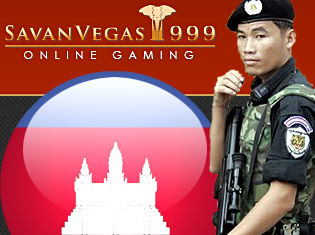 Authorities in Cambodia shut down an online gambling operation in an upscale region of the capital Phnom Penh on Friday. The raids on three villas in the Chamkar Mon district resulted in over 60 arrests; half of these were Cambodian nationals, the rest a mix of Malaysians, Indonesians, Chinese, Thais and Vietnamese. An unidentified police official told Cambodia Daily that the villas housed computers that allowed gamblers to access international online gambling sites.
Authorities in Cambodia shut down an online gambling operation in an upscale region of the capital Phnom Penh on Friday. The raids on three villas in the Chamkar Mon district resulted in over 60 arrests; half of these were Cambodian nationals, the rest a mix of Malaysians, Indonesians, Chinese, Thais and Vietnamese. An unidentified police official told Cambodia Daily that the villas housed computers that allowed gamblers to access international online gambling sites.
As of Monday, Major General Y Sokkly said none of the suspects had been released from the Ministry of the Interior’s custody, as the authorities were still trying to determine “what type of games were being played” inside the dwellings. An unidentified former security guard for the gaming operation claimed the sites offered “many different kinds of games, including betting on football.” Sokkly suggested the authorities’ slow process was the result of having no previous experience combatting online gambling, and that Friday’s raids were the first of their kind for his anti-terrorism unit.
Cambodian law doesn’t expressly forbid online gambling but other branches of Cambodian law enforcement have shown little compulsion about moving against operators who set up shop within the country’s borders. Despite these actions, Cambodia is a country where people will wager on the rain, so numerous online sportsbooks have taken up residence in areas such as Poipet, the special economic zone bordering Thailand that also contains Entertainment Gaming Asia’s new Dreamworld Club.
WARNING BELLS?
The involvement of Sokkly’s anti-terrorism unit may suggest Cambodia has decided to up its game against online operators, which could spell trouble for two prominent online betting sites that keep at least part their operations in Phnom Penh. Last month, Cambodia Daily printed a lengthy article on Creative Entertainment Ltd., the company behind two Curacao-licensed Asian-facing gambling sites, savanvegas999.com and clubvegas999.com, which offer live dealer casino services in English, Thai or Mandarin from brick-and-mortar casinos located just across Cambodia’s border with Laos in Savannakhet province.
One of these casinos, Savan Vegas, is owned by Macau-based Sanum Investments. Or at least it was, until November 2012, when Laotian authorities seized the casino after claiming that Sanum owed $23m in back taxes and penalties. Sanum filed suit against Laos with the World Bank’s International Centre for the Settlement of Investment Disputes, calling the “improper” taxes a shakedown remarkably similar to how Sanum lost control of its lucrative Thanaleng Slot Machine Club near Vientiane, Laos’ capital. The World Bank has opened an official tribunal into Sanum’s complaint, the result of which should be determined in, oh, around a decade.
Despite the ownership shakeup, the online sites continue to function under Creative’s control. Creative also occupies three floors of the Yellow Tower on Phnom Penh’s Chroy Changva peninsula and advertises locally for Thai-speaking telemarketers and online cashiers.
Cambodia Daily’s original report cited ClubVegas999’s claim that it was “registered and licensed by the Kingdom of Cambodia for Casino operations including online.” The “including online” portion has since been deleted, and Creative Entertainment counsel Marc Borg told the paper in June that the “erroneous” declarations of a Cambodian online license were “holdovers of draft website pages from quite some time ago.”
THE MEN BEHIND CREATIVE
Creative Entertainment was founded by US citizen Shawn Scott, who, along with partner John Baldwin, has a long and occasionally controversial history in US horseracing circles. The pair have pursued racing endeavors – in particular, moves to bring slot machines to racetracks – in states such as New York, Idaho, New Mexico and Maine. Some of these ventures have been wildly lucrative, including purchasing Louisiana’s Delta Downs track for $10m in 1999, leading a successful push to authorize the installation of gaming machines, then selling the property in 2001 to Boyd Gaming for $130m.
But it hasn’t been all gravy. In 1997, Scott relinquished a Nevada casino gaming license after the state Gaming Control Board criticized accounting practices at the Scott-owned Cheyenne casino in North Las Vegas, which Scott sold the following year. In 2003, Scott was denied a racetrack operating license in New York after being accused of making false statements on his application.
Borg claims both Scott and Baldwin resigned their positions with Creative “quite some time ago and long before Creative Entertainment had any involvement in online gaming.” But Bridge Capital LLC, a Saipan-based investment banking firm that lists Baldwin as CEO and Scott as vice chairman, is cited as the “billing contact” for the clubvegas999.com and savanvegas999.com domain names, which were registered in September 2011. Cambodia Daily reported that until it began asking questions in July, the Bridge Capital website listed Creative Entertainment as one of its investment “projects.” Furthermore, a 2012 article in the Vientiane Times cited Scott as the Chairman of the Savan Vegas Hotel and Casino Company Ltd.
In response to Cambodia Daily’s inquiries, Ministry of Economy and Finance deputy director Ros Phearun said he would be “taking action,” including passing on Creative Entertainment’s name to the same Ministry of Interior that now houses the individuals detained in Friday’s raids. A year ago, Thai authorities raided a small island off the coast of Phuket after they received a tipoff that the leaseholder, one John Baldwin, was in the process of setting up an unauthorized casino on the property. Despite the best efforts of the 60-odd Thai cops, no evidence of casino equipment was found. It remains to be seen whether Cambodian authorities will have any more luck in finding impropriety in Scott and Baldwin’s activities in Phnom Penh.
